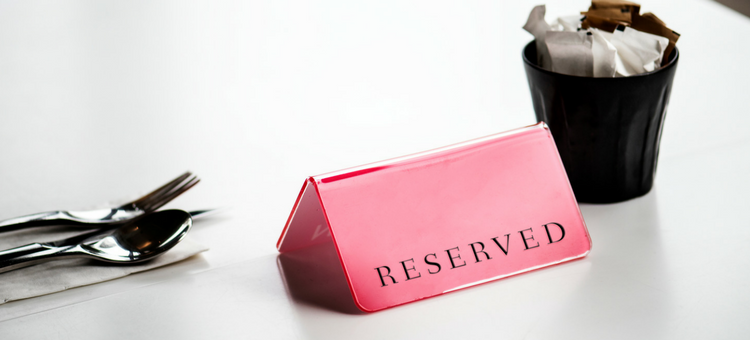
One dilemma restaurant businesses face is whether or not to take reservations. Determining whether or not a no-reserve policy is good or bad for your restaurant business really depends on a number of factors, such as the type of restaurant, space and seating availability, impression you want to give your customers, and so forth.
While there is really no right answer to this question, weighing the pros and cons can help you come to your own best conclusion about whether or not to take reservations in your restaurant.
Why Accept Reservations
Accommodates large groups and special occasions: Knowing is half the battle. If your restaurant staff knows in advance that a large group or guests with a special occasion will be coming in at a particular time, it tends to make everything smoother. Your guests will be seated quickly, and you can plan to have the right amount of staff on hand to help ensure those guests have the most enjoyable experience possible.
Contributes to higher check amounts: Diners who reserve their table for a special event or large group also tend to spend more money, which increases sales for the restaurant and also contributes to higher tips for the service staff.
Makes guests feel like VIPs: When guests immediately arrive at a restaurant and are greeted and sat at their table, it makes them feel important. And when guests feel important they are happy, contributing to a higher check amount and repeat visits.
Makes planning easier: If your restaurant knows how many guests to expect at any given time of the day or night, your staff will be better prepared, no matter the size of the table. Knowing what kind of traffic to expect in your restaurant can also help your management team better forecast sales figures, food costs, etc.
[fl_builder_insert_layout slug=”whitepaper-signup-module-rewards-program”]
When You Might Consider a No-Reserve Policy
Instills fairness among guests: Some restaurants are so popular guests may have to reserve their table weeks or even months in advance. Wait times can be very long but booking reservations so far in advance may be even more extreme. So to instill fairness among guests, a no-reserve policy might be the way to go.
No-show reservations disrupt your business: When the reserving party never shows up, sales suffer. Also, if you hold a table for too long for guests that do not honor their reservation, you are turning away business from guests that are already waiting for a table.
Party numbers change: Sometimes a reservation is changed without notice, such as the arrival of additional guests or children. When a restaurant makes plans to hold a table that accommodates four, only to have a party of seven arrive, restaurant staff has to adapt, which can put further delays on guests.
Are you still unsure which way to go? There’s always a happy medium. If you want to do away with your reservation policy but are concerned about its impact, consider replacing it with a call-ahead policy instead. Or if no-shows are hurting your business, require a credit card to hold the reservation.
